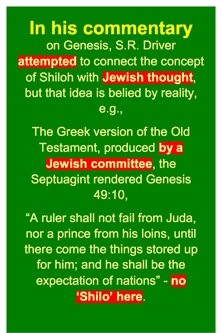![]()

Archives
(click to download a pdf)
The Bible Vindicated! - 20
The Bible Vindicated! - 21
The Bible Vindicated! - 22
The Bible Vindicated! - 23
The Bible Vindicated! - 24
The Bible Vindicated! - 25
The Bible Vindicated! - 26
The Bible Vindicated! - 27
The Bible Vindicated! - 28
The Bible Vindicated! - 29
The Bible Vindicated! - 30
The Bible Vindicated! - 31
The Bible Vindicated! - 32
Last time we saw how Jacob, speaking under the influence of the spirit of God, whose prophet he was called in Psalm 105,
•“called his sons and said, Gather together, that I may tell you what shall befall you in the last days...10 The scepter [king’s rod, his emblem of royalty] shall not depart from Judah, nor a lawgiver from between his feet, until Shiloh comes; and to Him shall be the obedience of the people...” - Genesis 49:1.10.
The proponent of higher criticism, S.R. Driver commented on this passage that there is no “allusion to ‘Shiloh’ as a title of the Messiah in any other part of the Bible.” Further, he attributes to the Jewish Talmud the making of the name Shiloh to be a title of the Messiah. As we will see later in this review, there are in fact references to this title elsewhere in Scripture.
But if this was an attempt by Driver to connect the whole concept of Shiloh with Jewish thought, it is belied by reality - those Jews who translated the Torah into Greek rendered the above passage,
•“A ruler shall not fail from Juda, nor a prince from his loins, until there come the things stored up for him; and he shall be the expectation of nations” - Genesis 49:10, LXX - no ‘Shilo’ here.
And the JPS Version of the Hebrew Scriptures, “translated by An Eminent Committee of Jewish Scholars” rendered the passage similarly to that of The Pentateuch and Haforahs of Soncino,
•“The sceptre shall not depart from Judah, Nor the ruler’s staff from between his feet, as long as men come to Shiloh, and unto him the obedience of the peoples be” - 49:10, JPS. The ‘Shilo’ here is not a person, but a place. Also, by the ‘peoples’ they means the tribes of Israel.
Driver continues in his comments on this passage in Jacob’s prophecy, “Nevertheless, the clause, viewed in relation to its context, does seem to contain a Messianic thought...and to render either Until he that is his shall come, or (though this rendering is not free from grammatical objection) Until he come whose (it is). The verse, in either case, will then promise that the sovereignty will not depart from Judah, till it is merged in the higher, more perfect sovereignty to be exercised by its ideal ruler, the Messiah.”
At this point this commentator continues to speaks as a proponent of higher criticism, which denies the possibility that there could be a Creator of this earth who has shared some details of His future plans for mankind -
“Such a reference to the Messiah seems however to presuppose the teaching of Isaiah, and other prophets...it must remain an open question whether v.10 is not a comparatively late addition to the original blessing, added for the purpose of introducing into it the prophetic thought of the future rule of the ideal king...” - he invents the “ideal king” to replace the scriptural Messiah.
He refers to further arguments against Shiloh being a title of Messiah in “the Excursus,” in which Gen. 49:10, ‘Until Shiloh come’ is discussed for MORE THAN FIVE PAGES. The very fact that such great effort has been made against this prophecy of Jacob by the critic, shows that the critic faced powerful testimony to the authenticity of Scripture as the word of God.
We propose next to demonstrate how exactly Jacob’s prophecy has been fulfilled.







